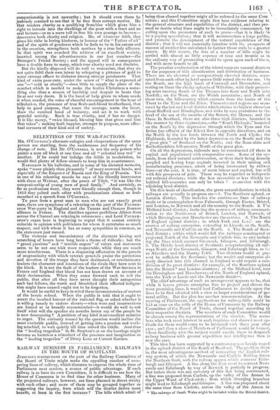RELENTINGS OF THE WAR-FACTIONS.
Mu. O'CONNELL'S alternate eulogies and vituperations of the same person are startling, from the suddenness and frequency of his change of note. But Mr. 0 CONNELL is not the only person who paints a man all black at one time and all " celestial rosy red" at another. If he could but indulge the foible in moderation, he would find plenty of fellow-sinners to keep him in countenance.
NAPOLEON in his bulletins, and in some of his dictated memoirs, spoke "more plainly than pleasantly" of many crowned heads, and especially of the Emperor of Russia and the King of Prussia. Yet in one of his relenting moods he says of his friendly intercourse with them at 'Weimar, after the peace of Tilsit, "it was like the companionship of young men of good family." And certainly, as far as professions went, they were friendly enough then, though in 1813 they pelted each other with proclamations almost as foul- mouthed as a speech from O'CONNELL.
To pass from a great man to men who are not exactly great men, there are symptoms of a relenting on the part of the PALMER• sTorr War-party in England and the THIERS and ODILON BARROT alliance in France. The diatribes against perfidious Albion from across the Channel are relaxing in vehemence ; and Lord PALMER• STON'S organ here is beginning to regret that it cannot entirely coincide in opinion with politicians for whom it entertains so much respect, and with whom it has so many sympathies in common, as the statesmen just named.
The violence and inconsistency of the alternate kissing and scratching of lovers have long been a theme of ridicule ; but the " grand passions" and " terrible angers" of rulers and statesmen seem to be not one whit more respectable, while they are much more mischievous. There is a disgusting affectation in the parade of magnanimity with which veteran generals praise the patriotism and devotion of the troops they have decimated, or revolutionary leaders the character and intentions of the rivals they have sent to the block. It is not the fault of the leaders of the War-factions in France and England that blood has not been drawn on account of their declamation. When they come forward each to tell the public, that after all they have never thought their antagonists such bad fellows, the waste and bloodshed their affected indigna- tion might have caused ought not to be forgotten. It would be useful to keep in mind these inconsistencies of orators of the heroic school. When the public is told that it ought to assert the insulted honour of the national flag, or asked whether it is willing tamely to endure slavery—when wars and insurrections are hinted at or broadly recommended—it would do well to ask itself what will the speaker six months hence say of the people he is now denouncing ? A problem of any kind is an excellent sedative to anger. The curiosity roused by the question would incline the most excitable public, instead of getting into a passion and work- ing mischief, to wait quietly till time solved the riddle. And thus the "leading tragedian" in St. Stephen's or on the hustings might become as harmless a stimulant of the passions and imagination as the "leading tragedian" of Drury Lane or Covent Garden.


























 Previous page
Previous page